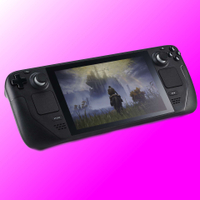While Valve's made it clear it won't be releasing a new Steam Deck every year, the handheld gaming PC market seems to be paying no heed. With talk of not one but three upcoming Lenovo Legion Go handhelds and Ayaneo teasing the Ayaneo 3, there was already plenty on the horizon for us connoisseurs of the lap and finger warmers.
There's now even more teasing afoot, this time of the more visual variety, as Ayeneo has released some tantalisingly shrouded images of the Ayaneo 3, which it now calls "Code: REVO". This codename, it says, "stands for the Revolution as the internal development code of Ayaneo 3, symbolizing the innovative strength that leads gamers [to] walk into a whole new dimension of Ayaneo handhelds".
Yeah… Ayaneo certainly knows how to toot its own horn. We knew this already, though, as the previous announcement proclaimed the upcoming handheld is a "revolution" and "foreshadows the future possibilities of handheld devices." In other words, a whole lot of "we're about to do something cool!" with little mention of what that cool thing is actually going to be.
Given Ayaneo seems to release handhelds like Apple releases iPhones, the emphasis on "revolution" might be an attempt to distinguish it from its own crowded lineup. Now would be the time to do so, too, given there are two new mobile processor generations out there, heralding the apparent AI era, in the form of Intel Lunar Lake (Core Ultra 200V) and AMD Strix Point (Ryzen AI 300).
The big debate over all upcoming handhelds will be which of these they opt for. It looks like Lenovo might go the AMD route for new Legion Go handhelds, with one of these being a Strix Point version of a possible Z2 APU, the Z2 Extreme. The MSI Claw 8, however, will feature a Lunar Lake chip, so it's an open field right now.



Chip speculation aside, apart from Ayaneo's flowery words, what we now have are some lovely "concept" images of the curvaceous Ayaneo 3, which looks pretty similar to the Ayaneo 2, full frontal glass panel and all. In other words, there's little here to tell us exactly how the new Ayaneo handheld is going to be so revolutionary.
If the Ayaneo 2 is anything to go by, though, the third generation might be a niche product. The second-gen launched above $1,000, and the handheld market now seems decidedly oriented around the $400-800 price bracket. You can pick up a Legion Go, for example, for $499 at Amazon right now and a ROG Ally for just $6 more.
The biggest gaming news, reviews and hardware deals
Keep up to date with the most important stories and the best deals, as picked by the PC Gamer team.
It doesn't matter how sleek the Ayaneo 3's concept design looks, the "Code: REVO" will certainly have to be revolutionary to see me part ways with over $1,000. There's always the chance it could break into the sub-$1,000 market and compete with other mainstream handheld gaming PCs.
Ayaneo handhelds in general aren't necessarily strangers to the sub-$1,000 market. The new Ayaneo Flip DS, for instance, is competitively priced at $749 and genuinely quite innovative, at least in its mad-scientist combination of Windows handheld and Nintendo DS design.
It's not impossible that the Ayaneo 3 could be competitive in the mainstream market. However, given it's continuing the Ayaneo 2's lineage, I somehow doubt it. But is that such a bad thing? High-end, expensive products are always more niche, but that doesn't have to be a mark against them. Unfortunately, all we have to go off right now are pictures and marketing spin, so we'll just have to wait and see.
Best handheld gaming PC: What's the best travel buddy?
Steam Deck OLED review: Our verdict on Valve's handheld.
Best Steam Deck accessories: Get decked out.

Jacob got his hands on a gaming PC for the first time when he was about 12 years old. He swiftly realised the local PC repair store had ripped him off with his build and vowed never to let another soul build his rig again. With this vow, Jacob the hardware junkie was born. Since then, Jacob's led a double-life as part-hardware geek, part-philosophy nerd, first working as a Hardware Writer for PCGamesN in 2020, then working towards a PhD in Philosophy for a few years (result pending a patiently awaited viva exam) while freelancing on the side for sites such as TechRadar, Pocket-lint, and yours truly, PC Gamer. Eventually, he gave up the ruthless mercenary life to join the world's #1 PC Gaming site full-time. It's definitely not an ego thing, he assures us.
Most Popular








![#AYANEO 3# [ Code: REVO ] The annual flagship handheld Console is Coming! - YouTube](https://img.youtube.com/vi/c_-0boVoewU/maxresdefault.jpg)
